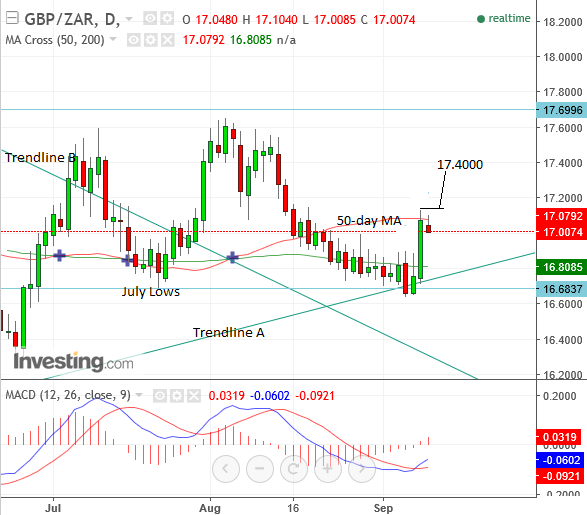South African Rand at Risk of Further Near-Term Losses vs the Pound

The strength of the Pound's recent rally against the Rand leads us to believe further gains might be eked out.
The GBP/ZAR exchange rate had been falling but reversed and rose sharply to our target at 17.08 - forecast in our last technical update.
Rand Merchant Bank's (RMB's) Jonathan Cairns puts Friday's rise down to "short-covering" which is when sellers are caught off guard by a sudden reversal. This short-covering technical rally is not unique to GBP/ZAR, as we note here, this driver is behind a rise in a range of Pound-based pairs.
So with technical considerations appearing to be of importance at present, our latest technical studies could prove more relevant than normal at this juncture.
We note the Pound's rise against the Rand encountered resistance at the 50-day moving average and stalled.

But the strength of the rally leads us to believe it will continue to extend higher to a future target at 17.40, but for confirmation of more upside we would like to see a move above the recent highs at 17.15.
Both the July lows and Trendline A are underpinning the recent 16.60 lows with support, and lessen the chance of a break lower.
The MACD has crossed above its signal line, producing a weak bullish signal, however, it is still below the zero-line which infers it is still in a downtrend rather than an uptrend.
Get up to 5% more foreign exchange by using a specialist provider by getting closer to the real market rate and avoid the gaping spreads charged by your bank for international payments. Learn more here.
South Africa's Domestic Agenda
In the week ahead the main release for ZAR is the Current Account at 9.00 BST on Thursday, September 14, which is forecast to show the deficit narrowing in the second quarter.
"We expect this week to provide further evidence of improving rand fundamentals: our estimate is that the 2Q17 current account deficit will come in at only 1.7% of GDP — the third quarter in a row where the deficit is under, or at least close to, 2%," says RMB's Jonathan Cairns, who added context as follows:
"As such, the rand no longer stands out as a “fragile” currency, one that is exposed to a sudden deterioration in global funding conditions."
Other data for the Rand includes Business Confidence on Wednesday at 11.00 and Retail Sales at 12.00.
Data and Events to Watch for the Pound
It looks set to be a busy week for the Pound with the Bank of England announcing their rate decision on Thursday, as well as data showing inflation, unemployment and wage growth.
The Bank of England is not widely expected to announce a change in policy on Thursday at 12.00 BST, and according to Canadian investment bank TD Securities, the voting is expected to show a 6-2 split in favour of keeping interest rates unchanged.
BK Asset Managment's Kathy Lien, highlights the continued weakness in "consumer spending and inflation," as a reason to expect the BOE not to, "veer away from its cautious tone."
Forecasters are expecting a rise in inflation when data is released at 09.30 on Tuesday, September 12.
The headline rate is expected to rise to 2.8% year-on-year from 2.6% in August 2016, and core inflation to 2.5% from 2.4% respectively.
Without a corresponding rise in wages, higher inflation is likely to weigh on the Pound rather than support it, as it simply results in everyone being poorer.
Which is why data out on Wednesday, September 10, is likely to be so important, as it will show the state of the UK labour market and wages. Expectations are for earnings to rise by 2.3% in August.
A beat on expectations in this number could prove to be supportive of Sterling.
Remember to keep an eye on politics at the start of the week as parliament intend to vote on the government's great repeal Brexit bill.
The Labour party are currently against the bill, which they say gives too much autonomous power to ministers to make changes to EU law once it is transposed into the UK legal system.
A small number of conservative MPs are also against the bill which means, the vote could be close given the government's slim majority.
A failure of the bill to pass, would cause volatility for the Pound with the most likely direction of travel being lower.
The time within which to negotiate Brexit is fast running out and any domestic legislative failures will only frustrate the process further.
However, damage would be limited as we would expect the domestic squables to have limited impact on negotiations themselves.
The increased uncertainty caused by the Bill's failure would argue for Sterling to devalue owing to the increased uncertainty such an outcome would bring.
However, we see little chance of Conservative lawmakers rebelling against the Government; the party's slim majority means there is little appetite for an election which they could well lose considering Labour and the Conservatives are near even in the polls




